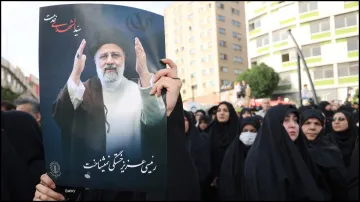Jerusalem: Amid widespread speculation that Israel, Iran's arch-rival, had a role in the untimely death of President Ebrahim Raisi after a helicopter crash in the East Azerbaijan province, an Israeli official told Reuters on the condition of anonymity that it was not involved in the crash. Raisi, 63, was confirmed killed along with his foreign minister Hossein Amir-Abdollahian and other officials when their helicopter crashed as it was crossing mountain terrain in heavy fog.
"It wasn't us," the Israeli official told Reuters, as the charred bodies of the Iranian President and others were found on early Monday morning. Israel and Iran have been longstanding enemies of each other, waging a "shadow war" for decades before it broke open with a tit-for-tat drone and missile fire last month, threatening an all-out war in the Middle East.
Iran has officially backed groups like Hamas, Hezbollah and Houthis, all of whom have fought Israel since war broke out on October 7 when Hamas-led militants killed 1,200 people in Israel. The ensuing retaliation by Israel has killed thousands of Palestinians in Gaza, which further flared up tensions between Iran and the Jewish country.
Iran-Israel hostilities
Iran views itself as the chief patron of Palestinian resistance to Israeli rule, and top officials for years have called for Israel to be wiped off the map. However, support for Iran has always caused controversy among the Palestinians, with some viewing Iran as a main backer in the conflict against Israel, in the absence of military support by Muslim Sunni regimes, while some accuse it of meddling in Palestinian affairs to serve its own purposes.
Raisi, a hard-liner viewed as a protégé and possible successor of Khamenei, chastised Israel last month, saying “The Zionist Israeli regime has been committing oppression against the people of Palestine for 75 years." Israel is believed to have carried out numerous attacks over the years targeting senior Iranian military officials and nuclear scientists.
Israel has long viewed Iran as its greatest threat because of Tehran's controversial nuclear program, its ballistic missiles and its support for armed groups sworn to Israel's destruction. "First of all we have to expel the usurpers, secondly we should make them pay the cost for all the damages they have created, and thirdly, we have to bring to justice the oppressor and usurper," Raisi said last month.
Meanwhile, Hamas and Islamic Jihad leaders have repeatedly thanked Iran for its military and financial support to the group in their decades-long fight against Israel. After the crash, Hamas praised the Iranian leader for supporting the Palestinian cause and resistance against Israel and expressed confidence that Iran's "deep-rooted institutions" would enable it to overcome "the repercussions of this great loss."
Iran announces snap presidential elections on June 28
Meanwhile, the heads of the three branches of the Iranian government have agreed on a date, June 28, for snap presidential elections in the country. As per Article 131 of the Iranian Constitution, the country's top three officials are mandated to arrange presidential elections within 50 days following the death or incapacitation of the incumbent president.
Supreme Leader Khamenei, who holds ultimate power with a final say on foreign policy and Iran's nuclear programme, said First Vice President Mohammad Mokhber, would take over as interim president, the official IRNA news agency reported. Mokhber, like Raisi, is seen as close to Khamenei. Deputy Foreign Minister Ali Bagheri Kani was appointed as acting foreign minister.
Iran operates under a system where the president and parliament are elected, but the supreme leader holds ultimate authority over major policies, the armed forces, and the powerful Revolutionary Guard. The supreme leader also appoints half of the Guardian Council, which vets candidates for various elections, including the Assembly of Experts, the body responsible for choosing the next supreme leader.
Funeral ceremonies for Raisi will be held from Tuesday to Thursday in the cities of Tabriz, Qom, Tehran and Birjand until his final burial at the Imam Reza Shrine in Masshad, according to Iranian media. Messages of condolences flooded in from Iran's other regional neighbours and allies, including the leaders of Syria, Egypt, the United Arab Emirates, Qatar, Jordan, Iraq and Pakistan. However, Israel has not commented on Raisi's death.
(with inputs from agencies)
ALSO READ | US expresses condolences for death of Iranian President Ebrahim Raisi
Latest World News
